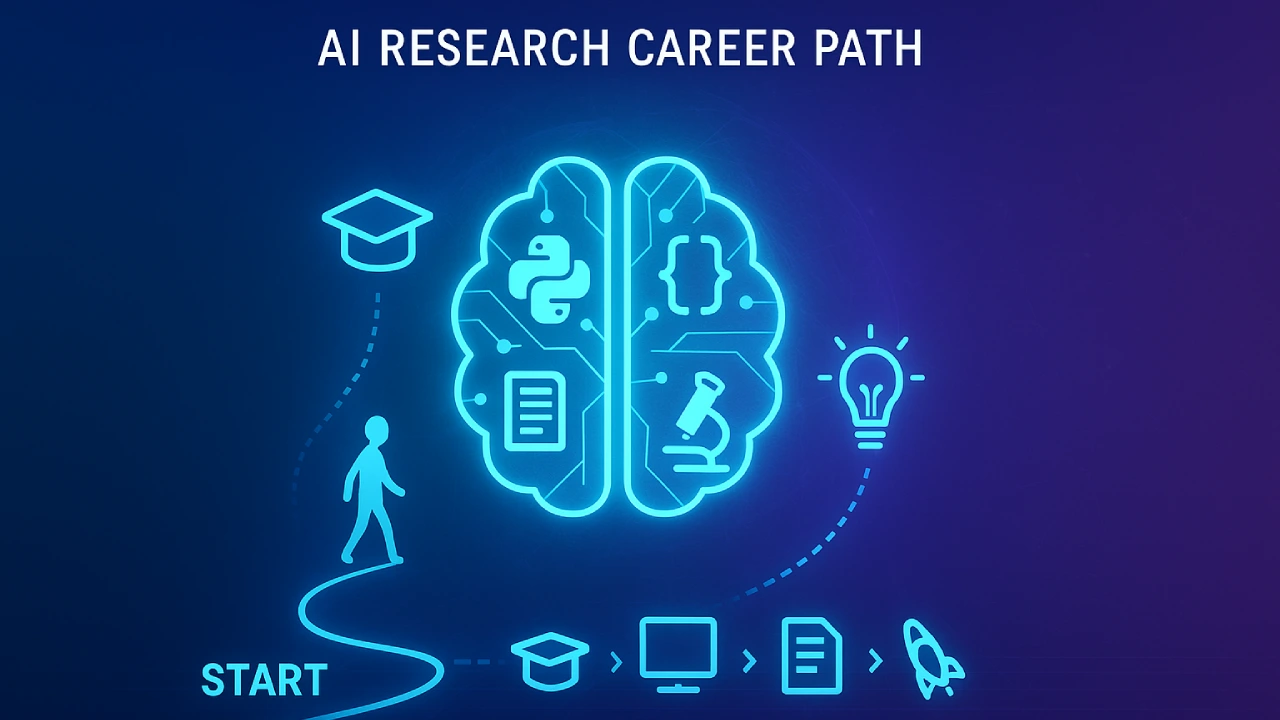Artificial intelligence (AI) is at the forefront of innovation, reshaping industries from healthcare to finance. At the heart of this revolution are AI research scientists—individuals dedicated to pushing the boundaries of what machines can learn and do. But how can one become an AI research scientist, particularly in a rapidly developing country like India? This guide breaks down the entire roadmap—education, skills, salary insights, and career tips.
What Does an AI Research Scientist Do?
Before diving into the path, it’s important to understand the role. AI research scientists design and test new algorithms, publish scientific papers, and develop state-of-the-art models in machine learning (ML), deep learning, and natural language processing. Their work powers innovations in self-driving cars, intelligent assistants, and more.
Step 1: Build a Strong Educational Foundation
The journey to becoming an AI researcher begins with education.
Recommended Degrees:
- Bachelor’s Degree: Computer Science, Mathematics, Physics, Engineering
- Master’s Degree (Preferred): AI, ML, Data Science, Robotics
- Ph.D. (Ideal): Specialization in AI/ML for academic and industrial research
Focus Courses:
- Data Structures and Algorithms
- Linear Algebra, Calculus, Statistics
- Machine Learning & Deep Learning
- Programming (especially Python)
Whether you’re learning in India or abroad, your curriculum should strengthen both your theoretical knowledge and hands-on programming ability.
Step 2: Develop Core Technical and Analytical Skills
Being an AI research scientist isn’t just about theory. You need practical coding skills and analytical thinking.
Must-Have Skills:
- Programming Languages: Python (primary), R, C++, Java (optional)
- ML Libraries/Frameworks: TensorFlow, PyTorch, Scikit-learn, Keras, NumPy
- Mathematics for AI: Probability, Statistics, Linear Algebra
- Model Building: Data preprocessing, hyperparameter tuning, model evaluation
You can significantly enhance your learning through hands-on projects and AI challenges such as Kaggle competitions.
Step 3: Gain Research Experience
To truly become an AI research scientist, you must get involved in real research work.
Tips to Build Research Credibility:
- Apply for internships at AI labs or research institutes
- Contribute to open-source AI research
- Work on thesis projects or publish in journals and top AI conferences (e.g., NeurIPS, ICML, CVPR)
- Build a GitHub portfolio of innovative AI projects
Even a single well-received paper can provide access to global AI research communities.
Step 4: Stay Updated and Join the Research Community
AI evolves rapidly. A strong habit of continuous learning is vital.
Keep Learning:
- Read top AI papers weekly (arXiv, Google Scholar)
- Follow influential AI researchers and labs
- Enroll in online AI courses (Coursera, edX, Udacity)
Network with Researchers:
- Attend AI conferences and workshops
- Join communities like AAAI, IEEE, ACM
- Use platforms like LinkedIn, ResearchGate, and GitHub to collaborate
Networking is crucial to landing high-impact AI research scientist jobs.
AI Research Scientist Salary Insights (India & Global)
Understanding potential earnings is essential when planning your career.
| Region | Monthly Salary (Avg) | Annual Salary (Avg) |
|---|---|---|
| India (Entry-Level) | ₹200,000+ | $120,000–$180,000+ |
| India (Experienced/PhD) | ₹2,00,000+ | $8,000–$12,000 |
| USA | ₹10–₹20 Lakhs | $120,000 – $180,000+ |
Note: These figures may vary based on company, experience, and educational background.
Are you looking for positions as an AI research scientist at Google, OpenAI, or Microsoft Research? A Ph.D. and publication history can give you an edge.
Courses & Certifications That Help
Here are some popular AI research scientist courses:
- Deep Learning Specialization—Andrew Ng (Coursera)
- AI for Everyone—Stanford Online
- Machine Learning with Python—IBM
- Ph.D. or M.Tech AI programs—IITs, IIIT Hyderabad, IISc Bangalore (India)
These courses help build a strong AI research scientist roadmap.
Conclusion: Your Roadmap to Becoming an AI Research Scientist
What steps should you take to become an AI research scientist? It’s a challenging but rewarding journey that blends technical skills, research experience, and constant curiosity. In India or globally, the path is similar: get educated, build skills, publish research, and stay plugged into the AI community.
Key Takeaways:
- Start with a degree in CS, Math, or related field
- Master Python, ML, and deep learning frameworks
- Get hands-on with research and publish your work
- Keep learning and networking with top researchers
Whether your goal is to become a high-paying AI research scientist, pursue a Ph.D. at a prestigious university, or simply explore the limits of AI, this roadmap will guide you in the right direction.







